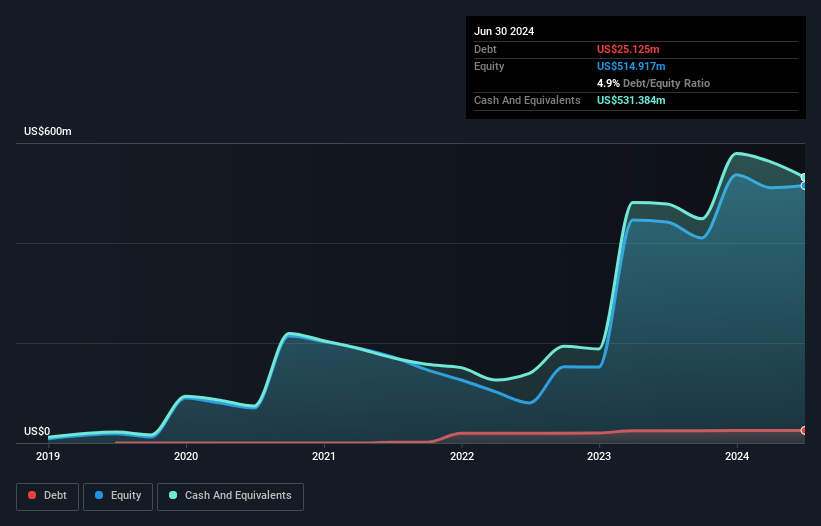Legendary fund manager Li Lu (who Charlie Munger backed) once said, 'The biggest investment risk is not the volatility of prices, but whether you will suffer a permanent loss of capital.' So it might be obvious that you need to consider debt, when you think about how risky any given stock is, because too much debt can sink a company. As with many other companies 89bio, Inc. (NASDAQ:ETNB) makes use of debt. But should shareholders be worried about its use of debt?
When Is Debt Dangerous?
Debt is a tool to help businesses grow, but if a business is incapable of paying off its lenders, then it exists at their mercy. In the worst case scenario, a company can go bankrupt if it cannot pay its creditors. While that is not too common, we often do see indebted companies permanently diluting shareholders because lenders force them to raise capital at a distressed price. By replacing dilution, though, debt can be an extremely good tool for businesses that need capital to invest in growth at high rates of return. When we examine debt levels, we first consider both cash and debt levels, together.
View our latest analysis for 89bio
How Much Debt Does 89bio Carry?
The chart below, which you can click on for greater detail, shows that 89bio had US$25.1m in debt in June 2024; about the same as the year before. But on the other hand it also has US$531.4m in cash, leading to a US$506.3m net cash position.

How Strong Is 89bio's Balance Sheet?
The latest balance sheet data shows that 89bio had liabilities of US$41.7m due within a year, and liabilities of US$25.6m falling due after that. Offsetting this, it had US$531.4m in cash and US$19.4m in receivables that were due within 12 months. So it actually has US$483.6m more liquid assets than total liabilities.
This luscious liquidity implies that 89bio's balance sheet is sturdy like a giant sequoia tree. Having regard to this fact, we think its balance sheet is as strong as an ox. Simply put, the fact that 89bio has more cash than debt is arguably a good indication that it can manage its debt safely. There's no doubt that we learn most about debt from the balance sheet. But it is future earnings, more than anything, that will determine 89bio's ability to maintain a healthy balance sheet going forward. So if you want to see what the professionals think, you might find this free report on analyst profit forecasts to be interesting.
Given its lack of meaningful operating revenue, 89bio shareholders no doubt hope it can fund itself until it has a profitable product.
So How Risky Is 89bio?
We have no doubt that loss making companies are, in general, riskier than profitable ones. And in the last year 89bio had an earnings before interest and tax (EBIT) loss, truth be told. And over the same period it saw negative free cash outflow of US$166m and booked a US$175m accounting loss. But the saving grace is the US$506.3m on the balance sheet. That means it could keep spending at its current rate for more than two years. Overall, its balance sheet doesn't seem overly risky, at the moment, but we're always cautious until we see the positive free cash flow. When analysing debt levels, the balance sheet is the obvious place to start. But ultimately, every company can contain risks that exist outside of the balance sheet. Be aware that 89bio is showing 3 warning signs in our investment analysis , and 1 of those is potentially serious...
At the end of the day, it's often better to focus on companies that are free from net debt. You can access our special list of such companies (all with a track record of profit growth). It's free.
New: Manage All Your Stock Portfolios in One Place
We've created the ultimate portfolio companion for stock investors, and it's free.
• Connect an unlimited number of Portfolios and see your total in one currency
• Be alerted to new Warning Signs or Risks via email or mobile
• Track the Fair Value of your stocks
Have feedback on this article? Concerned about the content? Get in touch with us directly. Alternatively, email editorial-team (at) simplywallst.com.
This article by Simply Wall St is general in nature. We provide commentary based on historical data and analyst forecasts only using an unbiased methodology and our articles are not intended to be financial advice. It does not constitute a recommendation to buy or sell any stock, and does not take account of your objectives, or your financial situation. We aim to bring you long-term focused analysis driven by fundamental data. Note that our analysis may not factor in the latest price-sensitive company announcements or qualitative material. Simply Wall St has no position in any stocks mentioned.
About NasdaqGM:ETNB
89bio
A clinical-stage biopharmaceutical company, engages in the development and commercialization of therapies for the treatment of liver and cardio-metabolic diseases.
Excellent balance sheet with slight risk.
Market Insights
Community Narratives



